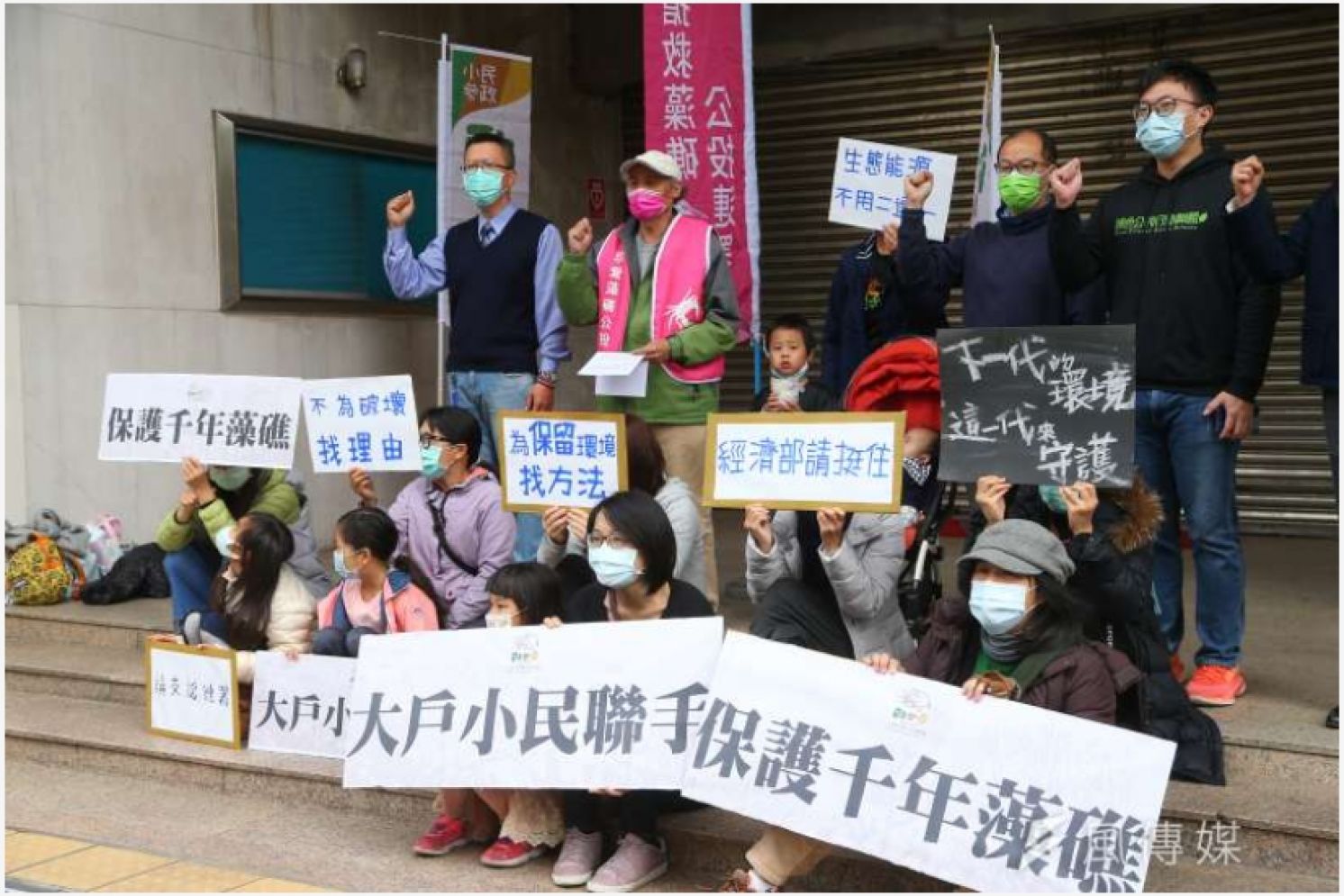
The Significance of the Overwhelming Support of Algal Reef Referendum
By Lin Chin-chia
The Storm Media, March 6, 2021
After three months of disappointing campaigning, the referendum to decide the destiny of the 7,600-year-old algal reefs miraculously exceeded the legal threshold of 290,000 petition signatures in the last week of February and quickly broke through the 500,000 mark on March 4. Although the result of the future referendum is unknown yet, the success of the campaign for public endorsement is a shot in the arm for the long sluggish and lackluster social movement after President Tsai Ing-wen took office.
Since the era of authoritarian rule in Taiwan, the Democratic Progressive Party (DPP) coordinated with civic groups (including labor, farmer, and aborigines groups), groups advocating for Taiwanese localization, and academic associations to participate in various social movements, including struggles for democracy, the rule of law, and human rights, environmental and ecological protection, and empowerment of disadvantaged social groups. Many DPP members had overlap participation in various aforementioned groups. After the DPP came to power, it began to assign some social activists to government positions, which led them to believe that their past ideals had a chance to be realized. Among these groups, some people got a piece of the pie and turned away from their previous ideals; some still have expectations for the DPP; or some others have a high tolerance for the DPP administration. Therefore, over the past five years, Taiwan's social movements have been lifeless—either disappearing, or quickly being appeased by the Tsai administration. Compared with their vigorous development when Kuomintang (KMT) was in power, it is simply not the same.
Not only that, but the Tsai administration’s coping skills for various opposition opinions have almost reached the point of proficiency after the 2019 party primary and the 2020 general election. The first is to control the opinion leaders of each group supporting the government and let them use their personal connections to conduct targeted lobbying at least to make sure non-supporters not speaking out against the government. The Tsai administration brainwashes traditional supporters through the supportive media and political commentators by means of choosing news content and enlarging or reducing the media volume, as necessary. The government benefits from using Internet celebrities and the young generations in the party to influence the views of young people. It also uses the Internet army and net communities to support party and government messages or carry out destructive cyber-attacks and smears against the opposition. These tactics, after the victory against contender, now Vice President, William Lai in the DPP presidential primary, were even more effectively used in the 2020 general election.
Significance of the Algal Reef Referendum
However, one who frequently treads in the dark will still stumble upon the ghosts. The groundswell of the public support for the referendum has finally broken through the above-mentioned blockades of the DPP administration. This shows four significant implications:
First of all, the greatest significance is that a government that is too arrogant to communicate, does not conform to public opinion, has double-standards in governance, always makes lame excuses for its mistakes, and only relies on internal propaganda to prop up public approval will eventually show its true color. In fact, it is not unacceptable that the policy positions are different being in power than when in opposition. The point is that those in power should candidly explain the reasons for their change of position and apologize if they are wrong. Don't we all like colleagues and friends like this? Only by communicating with the people and explaining the policy in a humble manner can they win the support of the people. If they continue to use ideology to discredit opponents and perform ideological kidnapping on the people, they may be reveling for a while, but they will only tear Taiwan apart and eventually be spurned by the people and leave notoriety in history.
Second, the algal reef referendum tells opposition parties that they must abandon their ideology and stand with the people to accumulate public support bit by bit. How did the DPP get started when faced with powerful party-state system under the KMT in the past? Today's opposition parties should work hard just like that. The opposition parties must put forward a vision for the future of Taiwan and the welfare of the people, supervise the ruling party, and force the ruling party to compete with better policies. This is the right thing to do.
Third, people are able to break free from ideological kidnapping and think about issues, especially public policies, outside the traditional box of blue-green divides. This is suited to a healthy and diverse society. Especially, to cultivate the spirit of independent thinking and judgment among young people is the blessing of the country's future.
Fourth, the referendum also gave Taiwan’s social movement groups an inspiration that people should not always look to a certain political party. Instead, they should leave ideology aside, open their mind, and engage in issue-oriented cooperation with political parties, that is to work with political parties to suit their own purpose.
It is the hope that before the referendum vote in August, people will have the opportunity to hear the ruling party’s elaboration on its economic and energy policies and environmental protection attitudes, as well as the views of environmental protection groups on the perpetuation of algal reefs and energy development, as parts of a modernized experience of civic education.
The author is a psychiatrist.